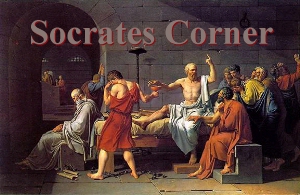All “Bragg” and no Bite: Why the New York DA’s Case Against Trump is 100% a Political Witch Hunt
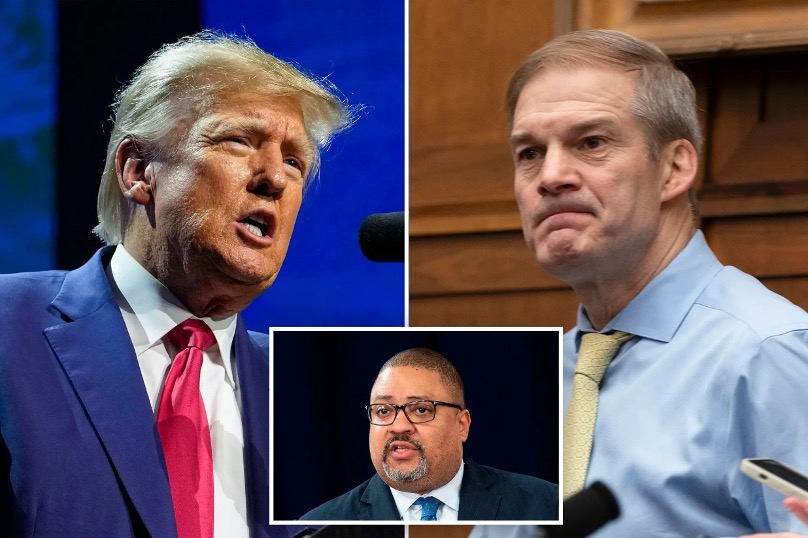
“Justice is supposed to be blind, regardless of race religion or Creed. However, here in Manhattan the scales of Justice are weighed down by politics. For the District Attorney, justice isn’t blind, it’s about looking for opportunities to advance a radical political agenda. Rather than enforcing the law, the D.A is using his office to do the bidding of left-wing campaign funders he’s taken his soft on crime approach to the real criminals”
~Rep. Jim Jordan (R-OH), Chair of the House Judiciary Committee
On March 31st 2023, Manhattan District Attorney, Alvin Bragg, did the unthinkable by issuing a criminal indictment against a former President of the United States. The indictment contains 34 separate felony charges against Trump’s perceived solicitation of hush money to porn star Stephanie Clifford, aka “Stormy Daniels”, all at the implementation of former lawyer and ex-convict Michael Cohen. The charges allege that Trump gave Cohen $130,000 to pay off Stormy Daniels to keep quiet about a sexual encounter between Trump and Daniels in 2006, just several months prior to his wife Melania giving birth to Barron Trump.
The money was given to Daniels as an agreement to stay silent about the affair just prior to the 2016 Presidential election. Bragg’s charges come at a relatedly opportune time in politics, just 3 months after Trump announced his bid to run for President in the 2024 election. The indictment also cites a separate $150,000 payment involving model Karen McDougal, whom was alleged to have had a sexual relationship with Trump. Another instance pertains to a doorman at Trump Tower claiming the former President had a child out of wedlock, and paid the employee $30,000 to keep quite. As unbelievable as these matters sound, Alvin Bragg’s office has aggressively pursued this.
Cohen’s Compromised Testimony & Denial on Both Sides
Almost immediately, President Trump denied the charges leveled against him. The 34 counts come after an unusual delay in jury deliberations at a Manhattan court. Amid speculations on why a jury verdict was repeatedly delayed Fox News anchor, Sean Hannity quipped that Bragg was incapable of “indicting a ham sandwich”, and that he was in over his head by promoting such brazen charges. Among one of the primary elements undermining Bragg’s case is the testimony of Michael Cohen, who imposes a compromising effect on the trustworthiness of the featured witnesses. Regarded by many as a “serial liar”, Cohen was brought up to offer his perception of the hush money claims made against his former boss.
Of course, outside observers looking at this case are scratching their heads wondering, why is an ex-convict with an axe to grind against Trump being relied upon as the star witness in Bragg’s indictment? Why would someone like Cohen, who went to jail for lying to Congress and tax evasion, be trusted to provide any truthful account of this matter?
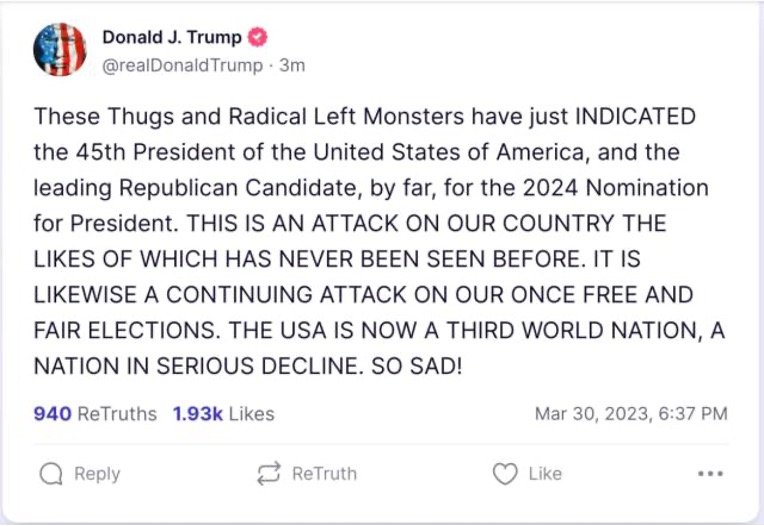
Bob Costello, Cohen’s former legal advisor addresses these concerns by exposing how Cohen does not possess any incriminating information to reinforce the criminal charges brought against Trump. “If he had any information about Donald Trump, that would have been the one time even for a serial liar like Michael Cohen to fess up and say, ‘I know this or that’”, Costello tells Hannity, “Because I want to save my own hide. But he didn’t do that”. After undergoing 2 hours of testimony, Cohen couldn’t offer any useful information to advance Bragg’s charges. Costello confirmed on Hannity’s show that Cohen told him multiple times that he lacked any incriminating information to undermine Trump’s innocence in the hush-money allegations. Hannity cites a February 2018 letter sent by Cohen’s legal counsel, Stephen M. Ryan, to the Federal Election Committee (FEC) confirming that Cohen was the one who contributed to the $130,000 payment to Stephanie Clifford. “Neither the Trump organization nor the Trump campaign was a party to the transaction with Ms. Clifford”, the letter reads.
This letter undermines a central facet of Bragg’s case, which rests largely on the presumption that Trump’s organization and campaign paid for a non-disclosure agreement with Clifford to cover-up an alleged affair from 2007. But there is zero evidence that such a payment was made by Trump’s affiliated entities, and the letter reinforces this. This raises suspicion as to whether the alleged affair in question ever took place. Clifford herself denied multiple times that the matter ever transpired, according to a 2018 letter. Prior to this, each party to the alleged affair denied it happened in 2006, 2011, and 2016. Bragg’s case flimsily relies upon a questionable non-disclosure agreement (NDA) that both parties have denied, with a prosecution that has failed to reveal essential pieces of evidence (calls, texts, etc.) related to the hush money scandal, all the while attempting to base the case off the testimony of a serial liar and ex-convict with an incentive to get revenge on Trump.
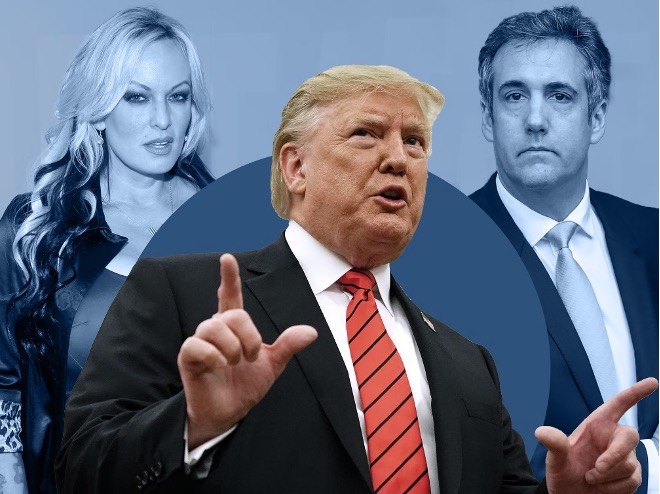
The Politics Behind Bragg’s indictment
Bragg’s March indictment of President Trump has raised eye-brows and drawn criticism from Republicans and Democrats alike. Bragg received sharp and concentrated criticism from Dan Abrams, a notably left-leaning TV host, who brings to light many of the flaws inherent in the DA’s approach. Abrams argued that it was a case that should never have been brought, precisely because it is a seven-year-old case that was never acted upon by the former NY DA Cyrus Vance Jr. This, despite Vance being a vehement Trump critic and a pursuer of a decade of Trump’s financial records who subpoenaed Trump organization officials for their tax returns. He has ardently pursued a politically motivated prosecution of Trump Organization officials for tax fraud. But, even Vance could not bring himself to pursue such a highly questionable and frivolous indictment in absence of critical evidence associating Trump with Clifford. Abrams had this to say when explaining why Bragg made a terrible mistake in resurfacing such an old case to prosecute Trump,
“Because it’s an old case that both the previous local DA and the feds passed on prosecuting. It would be bringing what is basically a souped-up misdemeanor seven years after the fact. ‘Souped-up,’ meaning using a novel legal theory to try to get it to a felony. There will probably be a lot of counts of it, it’s against the former president of the United States. And to be clear, to those who say he was president for four of those years, so that explains why couldn’t be prosecuted during that time — it’s not true. The local DA absolutely could have brought a case under New York law, but didn’t.”
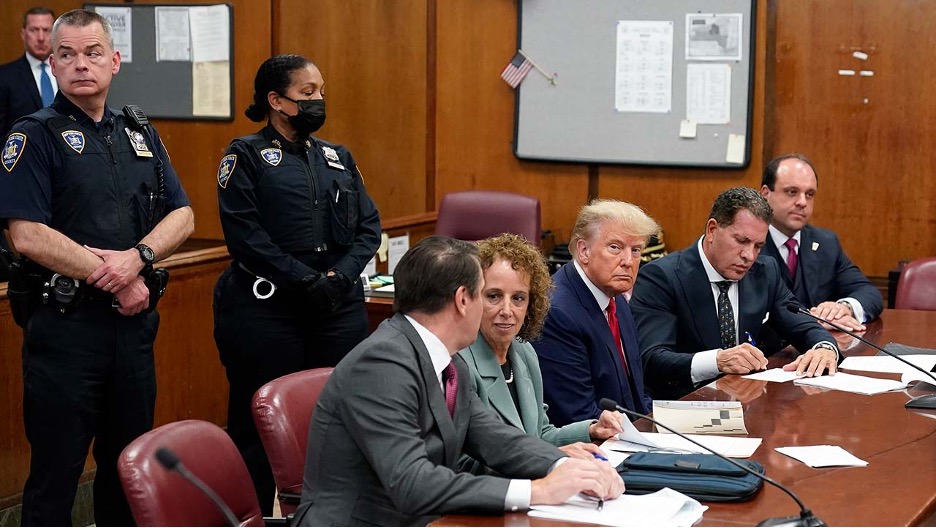
Donald Trump and his lawyers appears in a court in Lower Manhattan on Tuesday April 4th, 2023.
Such speculative criticism does make one wonder why the case was not brought under New York law during the time that Trump was completing his term in office. This speculation is heightened when looking to how Bragg chose not to pursue the serious tax and bank fraud charges that Vance had taken up. Abrams points out a critical flaw in the jurisdictional approach that Bragg took to initiate his case on the basis of civil law misdemeanors, rather than begin with criminal law felony charges. And Trump’s legal team recently issued a request to have the case tried in federal rather than state court to avoid a disadvantaged legal system and because the disputed matters occurred while Trump was a candidate for federal office. Lawyers seek to remove the case to federal court under a unique legal defense: Trump’s immunity under the U.S. Constitution’s Supremacy Clause.
The timing of the 34-count felony charges was clearly timed to undermine Trump’s re-election bid announced just four months prior. However, Bragg’s indictment made an unintended benefit to the Trump campaign’s fundraising efforts, enabling them to raise $7 million within a day of the charges being announced. The campaign was able to capitalize on the sense of outrage and disgust among Republican voters, elected officials and even potential 2024 contenders like former Vice President Mike Pence and Florida Governor Ron DeSantis. Many have denounced it as a “witch hunt”. The news also gave Trump a substantial boost in the polls, where he maintains large double digit leads over each of his rivals.
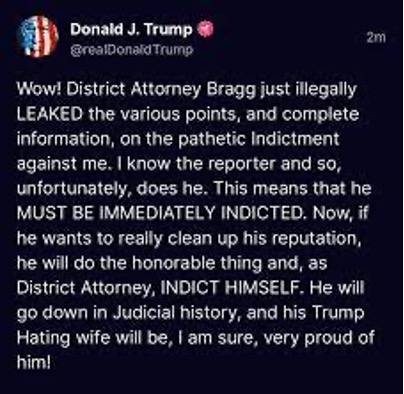
Many have alleged that Bragg is being pressured into pursuing such charges by George Soros and other far-left donors, manipulating his agenda from behind the scenes. In May 2021, Soros donated $1 million to the Progressive Color of Change PAC after it had endorsed and funded Bragg’s campaign for DA. During his campaign, Bragg expressed many times his promise to pursue charges against President Trump if elected.
House GOP efforts against Bragg’s case as an act of “Government Weaponization”
In addition to the underlying political motivations, Bragg’s indictment against President Trump has been branded by Republicans as a state-level demonstration of government weaponization. Where my previous article highlighted instances of federal agencies being weaponized against unsuspecting civilians in conjunction with corporate censorship, this article highlights a state officer working in concert with Democrat interests to weaponize the Southern District of New York against a Presidential candidate. Many House Republicans have pointed to the limited jurisdiction of Bragg’s office to interfere in a national election and undermine the court of public opinion with his own tainted sense of justice.
Rep. Jim Jordan (R-OH), Chair of the House Judiciary Committee, has openly criticized Bragg’s politically-charged indictment, calling for a judge to dismiss the lawsuit on frivolous grounds. He has also issued a subpoena to Mark Pomerantz, a former Manhattan prosecutor, to compel him to testify before Congress. This, based on an investigation by the Judiciary Committee regarding a measure that would prevent state and local prosecutors from pursuing “politically motivated state and local prosecutions” on current and former American Presidents. Pomerantz was instrumental in leading the hush-money case prior to Bragg’s tenure as DA.
In retaliation, Alvin Bragg sued Jordan on April 11th, calling on the U.S. District Court in the Southern District of New York to block Jordan and the Judiciary Committee from enforcing the subpoena. Jordan’s move to subpoena Pomerantz was wise and done as a means to get to the core of why the New York DA’s office has aggressively pursued such a suit against former President Trump while ignoring a host of more glaring issues facing the surrounding community, including how arrests and major crimes in the city (minus homicide) rose by 22% in 2022.
The House Judiciary Committee dug deeper into the criminal matters plaguing Manhattan under Bragg’s watch by hosting an April 17th hearing that involved several unfortunate victims of the rising crime epidemic. Those who testified included direct victims, the family of victims, and professionals who monitor homicide, hate-crime, gun violence and other major crimes in Manhattan. The hearing provided many powerful, emotional confessions on the negative effects of rising crime in the city. It also fueled the criticism made by Republicans that Bragg’s tenure as DA has facilitated a series of “pro-crime, anti-victim policies”, and has provided oxygen to the surges in violent crime, as seen across an increasingly dangerous community.
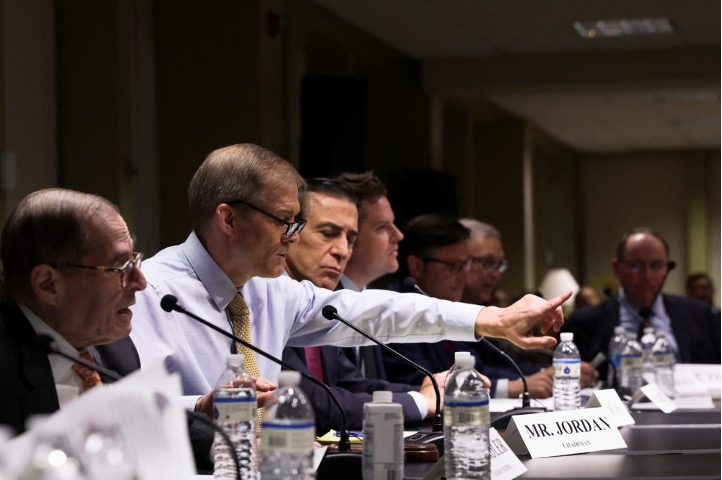
The House Judiciary Committee hosts a hearing on the “Victims of Violent Crime in Manhattan” on April 17, 2023
In a system that suffers from severe case backlog, Bragg’s office should be concentrating on prosecuting those responsible for such major crimes and working around the clock to stem the tide of violence. Instead, Bragg has abdicated his core responsibilities for maintaining public safety in exchange for zealously pursuing a seven-year-old case in severe lack of evidence in order to indict a former President and current Presidential candidate. Using a case that the Department of Justice disregarded and decided against pursuing, Bragg’s office now elevates it to the national spotlight, drawing ample attention amid an upcoming national election, with the hopes that he can make the charges stick this time. This prosecutorial pursuit is government weaponization plain and simple.
In closing, as Bragg’s indictment continues to build momentum, House Republicans should continue to exercise their subpoena power to compel testimony from anyone with key involvement in the Bragg indictment. Beyond Pomerantz, anyone who directed the launch of the indictment should be questioned for their underlying motivations. Congress should continue to consider enacting a law that would prevent the investigation of current and former Presidents in absence of legitimate reasoning and when politics is at play. Such a measure would mark an excellent curtailment against the weaponization of government by politically motivated prosecutors.
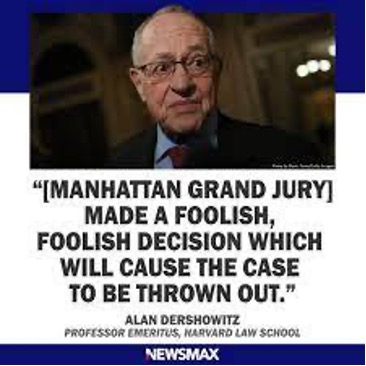
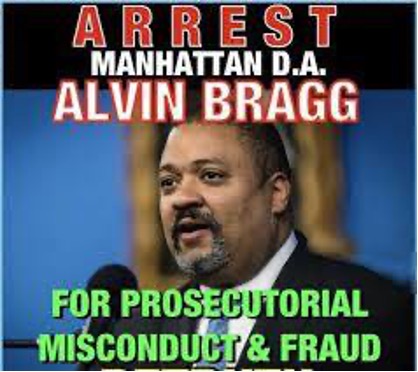
Category: Socrates Corner



